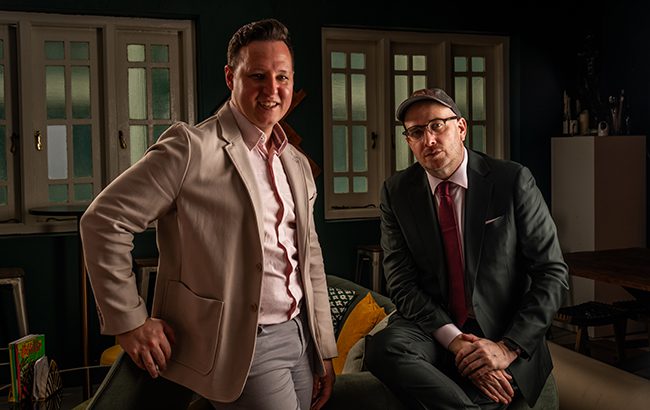Bobby Carey: ‘The next decade for alcohol will be tough’
Following his departure from Proof Creative, Bobby Carey has launched a consultancy called Studio Ryecroft. He spoke to us about his plans for the firm and why he’s thinking beyond alcohol.

Earlier this year, the spirits world was shocked by the news that Singapore-based distributor Proof & Company Spirits had gone into liquidation. The move affected only its Singapore arm, with its operations in Hong Kong and New Zealand continuing.
Its consultancy, Proof Creative, also remains in operation. However, its creative director, Bobby Carey, announced his departure from the business less than a month later.
Speaking to The Spirits Business, Carey confirmed the Proof Creative team is still operational. His decision to leave the business was spurred by visa issues, with his employment pass tied to the Singapore company. But it was the kick he needed to start Studio Ryecroft. “For a long time, I led the Proof Creative team, and I probably should have gone out there and done something myself,” he says.
“I feel like I’m following in my grandfather’s footsteps – he built the first cocktail bar in the southeast of Ireland in the ’50s. The company’s name is the name of his house. There’s a little bit of legacy following on from past generations of my family, which is cool.”
To launch the consultancy, Carey has partnered with Proof Creative’s former general manager for regional Asia, Tom Hogan. The pair have known each other for years, with Carey describing Hogan as a mentor. “He’s always been my sounding board,” Carey explains. “It just felt like a natural next step to do it together, and we’ve already had some good successes.
“As much as we both loved working for Proof, we’ve taken the great things we’ve learned and the things that we don’t want to replicate, and then brought them to this new agency.”
Concept to culture
Carey describes Studio Ryecroft’s approach as “concept to culture” – a philosophy rooted in creating bars that are embedded in their communities.
“What we really want to do is bring bars to spaces that are more culturally driven and more into the cultural narrative of a city,” he explains. “A lot of bars are opening up and becoming independent spaces that don’t necessarily intersect with the communities around them. They don’t really have longevity. So many bars have been focusing on awards, especially – it’s short-term success and long-term failure.”
For Carey, that could mean entering sectors outside the “high-energy cocktail bars” that Proof Creative became known for. “We still want to do [cocktail bars], but now we really want to focus on spaces that can become bastions of community for everyone.”
He’s particularly focused on the idea of third or fourth spaces. “When you and I were in university, we would hang out in the uni bar – but that doesn’t really happen as much around here,” he explains. “There are a lot of places springing up around me – board-game bars and spaces like that, which reach out to the whole community and become spaces with inclusivity. We’re looking at channelling our energy into these spaces.”
Luxury will remain a key component of his portfolio, however, and Studio Ryecroft has managed to sign a few key projects already – and although Carey can’t yet speak about some of them, he’s able to reveal that one project will be a “multi-layered, multifaceted” venue in Singapore.
Beyond alcohol
While Studio Ryecroft is firmly rooted in hospitality, Carey stresses it won’t be solely about spirits. “Alcohol is still a huge part of what we do, but we want to go into the world of culinary, brand experiences, and community-driven guest engagement,” he says. “We’ll naturally be layering the non-alcoholic into everything that we do. Wellness and wellness tourism here [in Singapore] are massive. We want to make spaces that straddle the line between alcoholic and non-alcoholic, spaces that are all-encompassing and inclusive.”
For Carey, this is part of a broader shift. “Going to the pub or a bar in Western culture was historically the only option when you wanted to socialise,” he explains. “But in Southeast Asia, China, Japan and Korea, the natural gathering space is an eating house, where drink is maybe a secondary evolution. Almost every culture here has a strong aspect of fermented drinks – it’s already built in.”
For him, the future of hospitality means looking outside of the alcohol space, adding: “The next decade for alcohol is going to be tough. Every day when I look at The Spirits Business, someone’s offloading.
“I don’t want to look back in 40 years and think we missed the mark when it comes to alcohol. I still love the world of alcohol. I love the storytelling, I love the hospitality aspect of it. There’s nothing better than going into a space and feeling special or, from the other side, making someone feel special and giving them a ritual. But that ritual doesn’t have to be defined by alcohol. If we can redefine that narrative and redefine what ‘craft’ is in that space, then we’ve won.”
Related news
Scottish on-trade nets 40% business rates relief
Are Indian investors waking up to the power of the on-trade?
